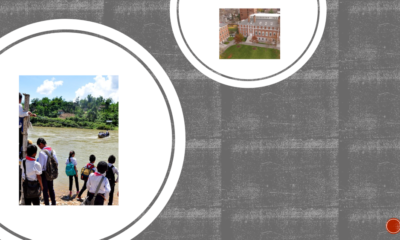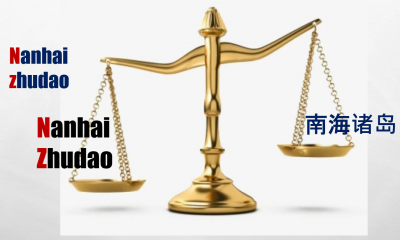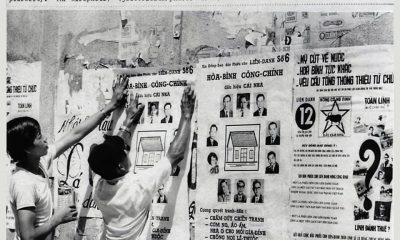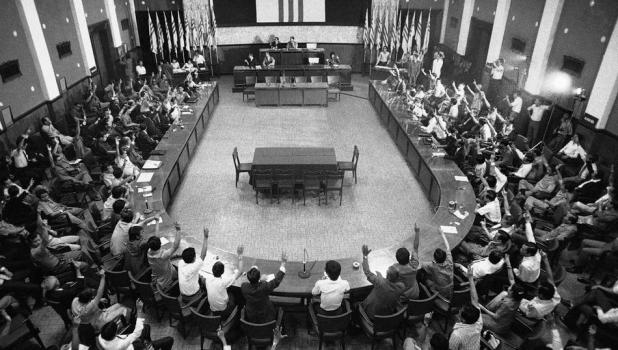Tai Van Ta, Harvard Law School
May 2007
Democracy in action: The 1970 Senatorial elections in the Republic of Vietnam (Part 1, Part 2, Part 3, Part 4, Part 5)
ABSTRACT
Prefacing and ending with brief summaries of the political history of South Vietnam (1954-75), this paper focuses on the 1970 Senatorial elections, studied through a pre-election poll and an exit poll of 875 voters in the capital city of Saigon (probably the only political poll, during that period, conducted independently by a non-governmental group of researchers under the guidance of a professor of social science research methods). The analysis of the results of the polls show that (1) Even the population sample is not idealistically a stratified random sample of the whole nationwide population, the study can predict correctly the outcome with the three victorious slates of candidates, although with a slight difference in ranking.; (2) that the mass followings of the two dominant religious forces, the Catholics and the Buddhists, and their prominent personalities, were the factors in their slates’ respective victories, with the ‘third force’ Buddhists being the strongest political force in society and the number one victor in the elections, even they were anti-government and ran against a government-supported slate of candidates; this latter, even with the full force of government help, came second to the Buddhist slate, and the interviewed voters said they voted for the Buddhist slate because besides its religious (Buddhist) representativeness , the voters wanted peace represented by the Buddhists’ position; and that (3) the Buddhists were victorious despite the fact that they did not use so much the campaign means (interviews in the press, posters and banderoles) as the other slates, and despite that they were heavily criticized in many articles in the newspapers, but they fiercely condemned the government.
It is interesting to note that this free and fair election, encouraged by US Ambassador Bunker, was the climactic development of democracy in South Vietnam, which incipient democracy, unfortunately, was to be killed—even before the Communist troops overran South Vietnam in 1975–by President Nguyen Van Thieu just one year later, in 1971, when he ran a one-man show of presidential elections.
SECTION II. THE REASONS FOR CHOOSING DIFFERENT SLATES OF CANDIDATES.
In this empirical research, we recorded faithfully the reasons adduced by the voters for their impending votes (755) or votes already cast (120) and then tabulates them in TABLE 4, in this order from most to least mention: (1)the candidates’ ability, (2) the candidates’ moral quality, (3) personal sympathy, (4) populist platform, (5)representative of a religion, (6) influence of others, (7) anti-communist or neutral stand, (8) sex and age factors, (9) peace platform, (10) effort to introduce themselves to voters.
TABLE 4. Reasons for choosing different slates of candidates.
(1) (2) (3) (4) (5) (6) (7) (8) (9) (10)
1. N V.Huyen 151 109 22 13 11 14 14 2 9 —
2. V V Mau 126 26 33 26 42 21 2 6 18 —
3. H V Cao 52 8 17 6 7 6 14 4 — 2
4. N C Hach 33 6 29 5 8 6 1 6 1 2
5. N P Dai 31 5 7 13 6 4 — 13 4 1
6. N N Huy 23 13 16 17 1 6 6 1 1 2
7. T V Le 18 3 8 4 — 4 4 4 — 2
8. T C Cuu 19 3 5 4 8 3 9 1 — —
9. N H To 7 1 7 10 — — 3 21 — —
10. N D Bang 2 — 2 11 17 3 — 1 3 —
11. N A Tuan 18 — 2 2 — 5 — 8 2 1
12. N G Hien 8 2 9 2 4 — 15 — — —
13. N T Hy 8 2 — 7 — 6 5 2 — —
14. P B Cam 11 1 5 2 — 1 1 1 — —
15. N V Canh 3 — 1 2 — — — 1 1 2
16. N V Lai 1 1 2 1 2 1 — — — 1
Total of
all slates 511 180 165 125 106 80 74 71 39 13
(37.5%) (13.2%) (12.8%) (9.2%) (7.7%) (5.8%) (5.4%) (5.2%) (2.8%) (1%)
Looking at this table, we see that the 3 most important criteria for voters’ choice of candidates—ability, moral quality, personal sympathy—are all related to the personality of the candidates. They were mentioned 856 times (or 63.5% of the reasons adduced). The remaining 7 reasons, mainly representing the platform or stand of the slates of candidates (except somewhat reason 8 on sex and age and 10 on the process of introduction), were mentioned 36.5%. The voting behavior was influenced more by the quality and personality of the candidates than by their platform. In developing countries, personality counts more than political stand. This also conforms to the next conclusion: the voters’ religion influenced their votes, but religion must be supported by the candidates’ personalities.
After this general observation, we have here several remarks on particular reasons for votes.
- First, the candidates’ ability. This meant educational level and professional achievement was mentioned by voters 511 times (or 37.% of the reasons adduced), referring to the ability of the head or members of the slate of candidates. Vietnamese voters at the time were practical, paying attention to the ability of the candidates to do their job in serving the public interest.
- Second, the candidates’ moral quality. Voters used such terms as “ ethics”(dao duc), “integrity”(thanh liem), or “ rectitude”(tu cach dung dan) to describe the moral quality traits they said they had found in the candidates they chose. For example, voters chose the Lily (Bong Hue) slate because of the moral quality–which they mentioned 109 times– of the honest senior attorney Nguyen Van Huyen, the head of the slate, and of the resolute elder statesman status (“Ong gia gan”) of former Prime Minister Tran Van Huong.
- Third, personal sympathy for the candidates. Recorded 165 times (or 12.8%) as the reasons adduced for voting, this sympathy might arise from an acquaintance with the candidates, but in most cases was due to the relationship as students to the head of the slate in question. That was why V V Mau and N C Hach received 33 and 29 votes, for this reason, more than other states, including N V Huyen. N N Huy as head of his slate also received 16 votes for this reason of the sympathy of students.
- Reasons for voting number 4 to no.10 concern the platforms of the slates or other social characteristics of the slates as groups (such as in 8 and 10). The reason no. 4 was the populist stand, embodied in voters’ descriptions such as “opposition to the government”, “dedication to the people’s interest”. It was mentioned 125 times (9.2% of reasons adduced). For the three opposition slates, it was mentioned more times than in the general trend: V V Mau (26 times), N N Huy (17 times) and N D Bang (11 times)
- The religious representativeness of a slate, inducing the voters to vote for it as having the same religion as voters, such as Buddhism, Catholicism, or Caodaism, etc, was mentioned 106 times (7.7% of reasons adduced). The Buddhist voters clustered to the support of V V Mau (Lotus) and N D Bang (Three lotuses), 47 and 17 times respectively, showing that the Buddhist voters wanted them to represent the majority of the Vietnamese population who were Buddhists and who had not yet, up to that time, been adequately represented in the National Assembly, especially in the Senate. This observation on the religious representativeness of the members of the slates reinforces the below analysis (in SECTION III) of the impact of the religious background of the voters themselves.
- The 6th factor, the influence of others on the voters’ choice, was mentioned 80 times (5.8% , not very high percentage) and was mainly true for female voters, who would refer to the influence of “husband”, “father”, “brother”, or “eldest son” and only a few of whom would mention “public opinion in general”. Vietnamese women, especially housewives, seldom had clear political ideas. Candidates would aim their campaign mainly at the adult males in a family.
- The anti-communist and anti-coalition stand was listed because this election occurred during an anti-communist war in South Vietnam. But it was mentioned only 74 times (5.4%), a proof that anticommunism and anti-coalition were no longer vote-getting stands as before. Moreover, most of the voters who adduced this reason said their votes were to be for the Catholic slates of N V Huyen (14), H V Cao (14), N G Hien (15). The war-hawkish, anti-communist/anti-coalition image of this N G Hien slate (factor causing the receipt of 15 votes), as well as other factors influencing the votes for this slate (ability, 8; moral quality,2; personal sympathy, 9; populist stand,2) did not help this slate whose ranking was number 12 both in the survey and in actual voting result, nationwide; or number 13 in actual voting result in Saigon. The people wanted peace, no more anti-communist war at any price.
- The sex and age groupings of the candidates as a vote-getting factor, adduced as reasons for the voters to support them, were embodied in such descriptions as “the slate consists of young people”, “new people”, “intellectuals”, “with women”. This factor, not very important (mentioned 71 times, or 5.3%), did not decide on the success or failure of a slate. If we consider the criteria “young people”, “new people” and “women” separately (they were indeed separate criteria of choice), we would see that sex and age were not important, with the exception of the slate of the lady attorney N.P.Dai who received 13 votes on this basis of female voters’ preference for a slate headed by a charming woman.
- The peace position of candidates was mentioned by some voters. Although the number of votes for this position in the survey (39) and its percentage in the totals (2.8%) were not very high, reflecting the realistic assessment of the Vietnamese electorate that question of war and peace had gone beyond the control of the Vietnamese themselves and 10 more Senators for peace might not be the swallows that make the Spring, it was this peace position of the Lotus slate headed by V V Mau which was an important factor in receiving 18 votes in the survey and in carrying it to its nationwide victory as the number one vote-getting group, especially among the Buddhist voters
- Finally, the effort of self-introduction to the electorate, such as captivating symbols, many posters, talks on the television, might be a factor, but not very important(mentioned 13 times, or 1%), in the choice of voters.
* The author of this study thanks his students M.T.Cuong, N.V.Chinh, N.H.Duc, V.T.Dat, C.D.Phuc V.Tan, N.V.Tung, N.X.Thang, N.V.Trung, N.V.Vinh, N.H.Y, who helped to interview the voters, and his colleagues’ professors Diep Xuan Tan and Le Cong Truyen for analyzing part of the data, and especially professor Nguyen Van Bong, Chairman of the Association for Administrative Research who had encouraged and financed this project.
The author dedicates this study to the memory of the two leaders in the victorious Hoa Sen (Lotus) Slate of Candidates in the 1970 Senatorial Elections: The head of the slate, Professor Vu Van Mau, former Saigon Law School Dean and professor of the author, and later the author’s colleague in the same school, and Dr. Bui Tuong Huan, Saigon Law School professor and President of Hue University.
Democracy in action: The 1970 Senatorial elections in the Republic of Vietnam (Part 1, Part 2, Part 3, Part 4, Part 5)

 Politics & Economy3 years ago
Politics & Economy3 years ago
 Society & Culture4 years ago
Society & Culture4 years ago
 ARCHIVES4 years ago
ARCHIVES4 years ago
 Politics & Economy3 years ago
Politics & Economy3 years ago
 Politics & Economy4 years ago
Politics & Economy4 years ago
 Politics & Economy3 years ago
Politics & Economy3 years ago
 Politics & Economy4 years ago
Politics & Economy4 years ago
 ARCHIVES3 years ago
ARCHIVES3 years ago





